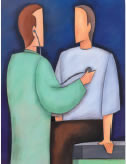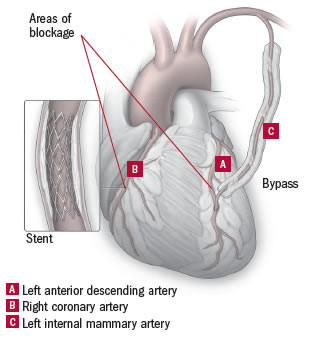
5 timeless habits for better health

What are the symptoms of prostate cancer?

Is your breakfast cereal healthy?

When pain signals an emergency: Symptoms you should never ignore

Does exercise give you energy?

Acupuncture for pain relief: How it works and what to expect

How to avoid jet lag: Tips for staying alert when you travel

Biofeedback therapy: How it works and how it can help relieve pain

Best vitamins and minerals for energy

Should you take probiotics with antibiotics?
Heart Health Archive
Articles
Gain more weight, get more GERD
Maintaining a healthy weight is the best way to rein in gastroesophageal reflux disease (GERD), or chronic heartburn, according to a study in The American Journal of Gastroenterology. Researchers found that GERD symptoms increased for every incremental rise in body mass index (BMI), which measures the ratio of weight to height.
In GERD, the acidic contents of the stomach back up into the lower esophagus, causing burning pain. The most effective treatment for GERD is taking an acid-reducing proton-pump inhibitor medication, such as omeprazole (Prilosec). People who are overweight are much more likely to develop GERD.
Should you worry if you have a fainting spell?
Drinking lots of liquids helps prevent fainting and is especially important in warm weather. Image: Thinkstock |
A fainting spell can be inconsequential, or it can signal a serious health issue. It's important to learn why you faint.
Add strength training to your fitness plan
Muscles at workDynamic resistance occurs when muscles and joints move, such as when you raise and lower a hand weight. Image: Thinkstock |
Boosting your muscle mass may trigger changes that enhance heart health.
Ask the doctor: Why does diabetes raise heart disease risk?
Q. I just got diagnosed with diabetes and my doctor said I am at risk for heart disease. Why?
A. Diabetes is considered to be an extremely strong risk factor for heart disease. One reason is that people with diabetes are also more likely to have other conditions that raise their odds of heart disease, such as obesity, high blood pressure, or elevated LDL cholesterol. Also, those factors seem to have more of a detrimental effect on people who have diabetes compared with those who don't.
Ask the doctor: What can cause a heart murmur in an adult?
A heart murmur may indicate an aortic or mitral valve problem. Image: Thinkstock |
Q. When someone develops a heart murmur as an adult, what are the possible causes?
Lowering blood pressure: How low should you go?
Blood pressure that is Image: Thinkstock |
The dangers of hypertension are well documented, but low blood pressure levels can cause problems, too.
Get cracking: Why you should eat more nuts
Nuts are rich in unsaturated fats, fiber, and other nutrients with possible cardiovascular benefits. Images: Thinkstock |
Munching a small handful every day may protect your heart.
Get a leg up on varicose veins
Leaky leg veins can cause painful skin changes. But safe, effective treatments can fix this common problem.
Varicose veins—those dark blue or purple leg veins that bulge just beneath the skin's surface—leave many sufferers feeling self-conscious. But beyond the cosmetic considerations, pooling of excess blood in the lower extremities can cause painful leg swelling and skin ulcers.
Bypass plus angioplasty: The best of both worlds?
In hybrid heart surgery, the blocked or narrowed left anterior descending artery is bypassed with the nearby left mammary artery, while another blocked artery (in this case, the right coronary artery) is opened with angioplasty plus a stent. Illustration by Scott Leighton |
Known as hybrid coronary revascularization, this technique may become more widely available in the future.
Listening to your favorite music may relax your arteries
Music has charms to soothe a savage breast, as the 17th-century poet William Congreve wrote. In fact, music might soothe your heart by relaxing your arteries, a small study hints.
Researchers measured arterial stiffness in 20 healthy young adults before and after they listened to 30 minutes of classical music, rock music, or nothing (as a control). They used a technique called carotid-femoral pulse wave velocity (PWV). This measures the time it takes for the pulse to travel to the carotid artery in the neck versus the femoral artery in the leg. Longer pulse times suggest stiffer arteries, which translates to a higher risk of cardiovascular problems. Higher "wave reflections" (another measure of artery health) are also linked to heart disease risk.

5 timeless habits for better health

What are the symptoms of prostate cancer?

Is your breakfast cereal healthy?

When pain signals an emergency: Symptoms you should never ignore

Does exercise give you energy?

Acupuncture for pain relief: How it works and what to expect

How to avoid jet lag: Tips for staying alert when you travel

Biofeedback therapy: How it works and how it can help relieve pain

Best vitamins and minerals for energy

Should you take probiotics with antibiotics?
Free Healthbeat Signup
Get the latest in health news delivered to your inbox!
Sign Up











